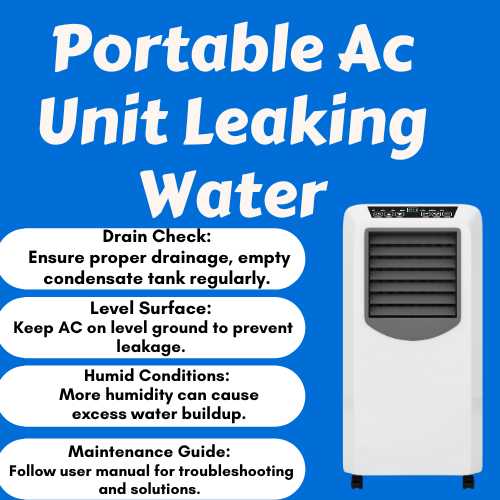Portable air conditioning units are a convenient way to cool your space but what happens when you notice water leaking from them?
This article addresses the common issue of a portable AC unit leaking water and provides insights into why it occurs how to prevent it and effective solutions to fix the problem.
We will explore the reasons behind the leaks offer step-by-step preventive measures and guide you through troubleshooting techniques.

Understanding Portable AC Unit Leaking Water
When you find water pooling around your portable AC unit it can be concerning. This is often a result of condensation which is a natural occurrence when warm air meets a cold surface. The cold coils within the AC unit cause moisture in the air to condense into water droplets.
Causes of Leaks
Condensate Drain Blockage
Over time dust and debris can accumulate in the condensate drain leading to a blockage. This blockage prevents the proper drainage of water causing it to overflow and leak from the unit.
Incorrect Installation
Improper installation can result in the unit not being level causing water to collect in one area instead of draining properly.
Excessive Humidity
High humidity levels can lead to more condensation within the unit potentially overwhelming the drainage system.
Preventive Measures
Regular Maintenance
Clean the filters and condensate drain regularly to prevent blockages and ensure smooth water drainage.
Proper Unit Placement
Place the AC unit on a level surface to ensure proper drainage and prevent water accumulation.
Use of a Drain Pan
Consider placing a drain pan under the unit to catch any excess water and prevent damage to your flooring.
Solutions for Portable AC Leaks in 3 Steps
Clearing the Condensate Drain
Use a pipe cleaner or a small brush to clear any blockages in the condensate drain allowing water to flow freely.
Adjusting the Unit
If the unit isnt level adjust it to ensure that water flows toward the drainage area.
Installing a Condensate Pump
For units in basements or areas with no floor drain a condensate pump can help pump out excess water.
Troubleshooting
Inspect for Leaks
Check for any visible cracks gaps or damage in the unit that could be causing the leakage.
Check for Blockages
Inspect the filters and drainage pipes for any clogs that might be impeding the proper flow of water.
Frequently Asked Questions (FAQS)
Is a small amount of leakage normal?
Yes, a small amount of water near the unit is normal due to Condensation.excessive pooling indicates an issue.
Can I use my AC unit without a drainage system?
It’s not recommended as it can lead to water damage and reduced cooling efficiency.
How often should I clean the filters?
Cleaning the filters every two weeks during heavy usage is ideal to prevent blockages.
Can leaks lead to electrical hazards?
Yes, water leakage near electrical components can pose a risk of electrical shock. It’s crucial to address leaks promptly.
Can I Reposition the unit myself for leveling?
Absolutely most units have adjustable feet that allow for easy leveling.
Should I be Concerned About Mold Growth?
Yes, stagnant water from leaks can create a conducive environment for mold. Promptly address leaks to prevent mold issues.
Conclusion
Dealing with a portable AC unit leaking water might seem daunting but with the right knowledge you can take effective steps to prevent and fix the issue. Regular maintenance proper placement and swift troubleshooting can keep your AC unit running efficiently and your space comfortable. Remember, safety comes first—address leaks promptly to avoid potential hazards.
For more information about various aspects of portable air conditioners including reviews comparisons and expert advice explore Indedsolution’s Portable Air Conditioners where you can find insightful resources like:
- The Complete Guide to Hisense Portable Air Conditioners: (Price, Reviews, and More)
- The Ultimate Guide to Portable Air Conditioners vs Window Units
- Honeywell Portable Air Conditioners Price|Reviews|Btu Guide
- Best Portable Air Conditioners for Small Spaces – 200-400 Sq Ft Top Picks
- Best Portable Air Conditioners for Large Spaces 500 To 700 Sq Ft Top Picks
- Expert Tips for Choosing The Perfect Portable Air Conditioner Size
- Tips How Can I Increase The Efficiency of a Single-Hose Home Portable Air Conditioner?
- Tips How to make a Portable Air Conditioner More Efficient?
- LG Portable Air Conditioners(Price,Reviews,Btu)Comprehensive Guide
- Are Portable Air Conditioners Worth It?
- How to Install a Portable Air Conditioner in a Sliding Window? (Step by Step Guide)
- Portable AC vs Central AC Power Consumption: Making the Right Cooling Choice
- Portable Air Conditioner Vs Mini Split: Choosing the Right Cooling Solution
- How Long Do Portable Air Conditioners Last?
- How to Find a Portable AC Within $200 To $1000 Budget?
- How Useful Is a Portable Air Conditioner Compared to a Split AC?
- Best Mini and Small Portable Air Conditioners Start From $36
- Best Industrial and Commercial Portable Air Conditioners for Ultimate Cooling Efficiency
- Best Energy-Efficient Portable Air Conditioners (Review By Expert)
- How to Choose the Perfect Camper and Van Portable Air Conditioner: Expert Tips
- How to Choose the Best Portable Air Conditioner Without Hose?15 Expert Tips
- Best Portable Air Conditioner for (Specific Room Size)
- Best Portable Air Conditioners for Apartments
- The Ultimate Guide For Exhaust-Free Portable Air Conditioners
- 10 Best Quietest Portable Air Conditioners For Your Bedroom Reviews And Guide
- Why Is Your Portable Air Conditioner Leaking Water? Unraveling the Mystery and Offering Solutions
- How to Avoid Them When Using Portable Air Conditioners
- Is there a good portable air conditioner under $200? Quick Guide
- A Guide to Portable Air Conditioners for Travel Trailers: Features, Installation and Maintenance
- Smallest Portable Air Conditioners for RVs And Tiny Spaces
Remember, your quest for a cooler environment is met with a plethora of resources and expert insights at Indedsolution’s Portable Air Conditioners.